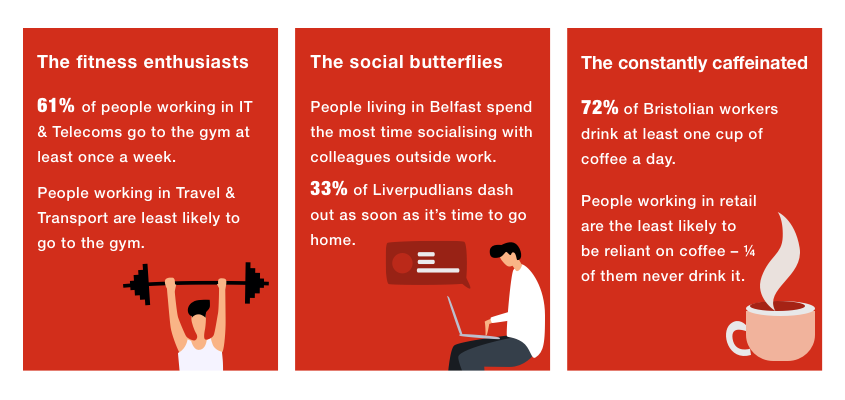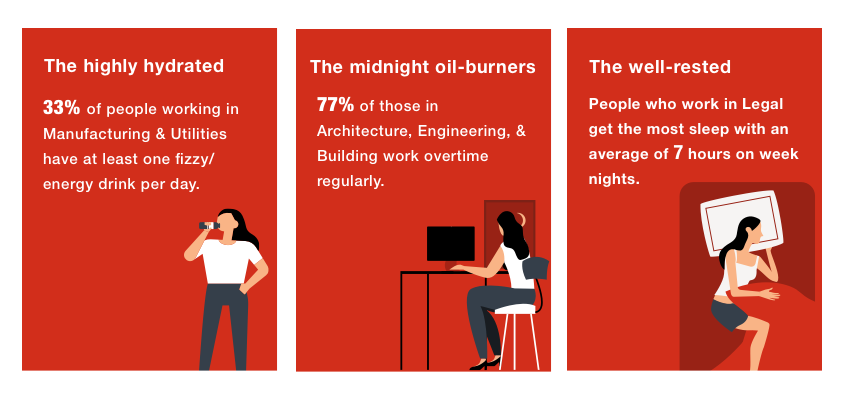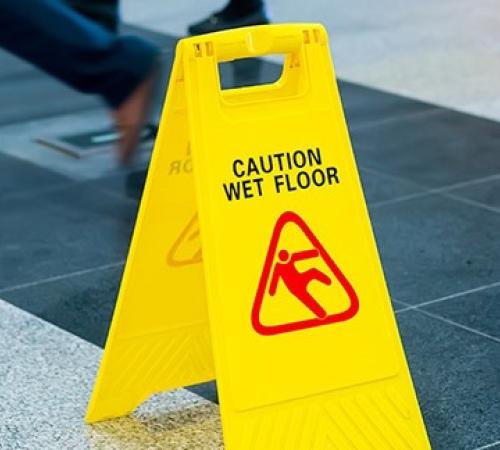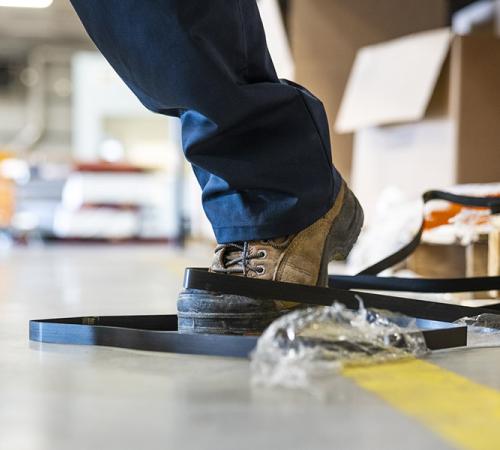

Being happy and productive – with the perfect work-life balance – is the ultimate dream. But, with our busy modern lives, it’s not always easy to figure out the habits that can shape success at work, let alone find the time to put them into practice. If only there were some simple changes we could make to send us in the right direction.
We surveyed people from all around the UK working across ten different industries to see if we could identify the different types of workers, and what drives them. Is there anything we can learn from the people who spend their free time in the gym? Are social butterflies earning more than those who head straight home from work? Is caffeine fuelling our most successful workers? Read on to find out how UK employees manage their time and see if you can work out which demographic you fit in to.

The fitness enthusiasts
Getting up at 5 am for an early morning run, heading out to a crack-of-dawn yoga class, spending lunchtimes clad in lycra to get in an extra run or leaving a few minutes early to get prime position in spin class. The gym bunnies are all about exercise.
The most active gym bunnies are most likely to work in IT & Telecoms. People from this sector visit the gym an average of 10 days a month. 61% of them go to the gym at least once a week, with 11% going every single day.
People working in travel and transport are the least likely to head to the gym, with over half of respondents from the industry (52%) admitting they never go.
The social butterflies
The social butterfly never forgets a birthday and they’re always the first port of call when arranging gifts or drinks for colleagues. They know about everyone’s holidays, family engagements and even the name of the cleaner’s goldfish. And, obviously, they know all the best gossip – but would never tell a soul! It’s a wonder they have time to squeeze in any work.
It seems the Irish live up to their reputation for enjoying a good craic, with people from Belfast spending the most time with their colleagues outside of work and some even admitting to spending more time socialising with their workmates than they do their friends.
The constantly caffeinated
A lot of industries are held up by caffeine[1], and many of us can’t function without that first cup of joe. But some of us need that daily pick-me-up more than others. Those working in the architecture, engineering and building sectors are the most dependent on their caffeine hit, with 66% drinking at least one cup per day. Our survey shows that 48% of those working in these sectors work overtime at least once a week – which could go some way towards explaining the need for that extra caffeine boost.
People working in retail are the least likely to be reliant on coffee to function, as almost a quarter of them report never drinking it. But it’s not only coffee we’re getting our caffeine hits from; energy drinks are also helping to fulfil the caffeine cravings of the UK’s workers. Nowhere more so than in the manufacturing and utilities industry, where 33% of workers enjoy an energy drink at least once a day.
Bristol is the most caffeinated city with 72% of Bristolian workers drinking at least one cup of coffee a day. Workers from Norwich instead prefer a nice cup of tea, with an average of almost 7 in 10 of them drinking it at least once a day, with the numbers among all tea drinkers in the region averaging out at 17 cups a week!

The midnight oil-burners
These folks always seem to be working. They’re the first ones at their desks in the morning and the last ones to leave every evening, begging the question – just how do they do it? To find out you’d have to ask someone from the IT & Telecoms industry, with our survey results showing that a sizeable 75% of people in this category are regular late-workers.
86% of those earning over £75k per year also report sometimes staying late at work, but these high earners aren’t the ones burning the midnight oil, with 3 in 5 of them saying that they get over 6 hours of sleep per night.
What is success?
There are no hard-and-fast rules for success. One person may equate earning a high salary to success, while someone else may view being able to spend time in the gym training for their next triathlon as the most important factor. So, it’s worth remembering that the best way to approach your working week is by finding the habits that are a good fit for you and your business – regardless of what others do.
Having happy, productive employees is a key aim of all businesses, whether they employ a thousand staff or just one. But if things do go wrong and you find yourself with an employee who gets hurt while on the job, having employers’ liability insurance can protect you from any costs incurred.
Disclaimer:
At Hiscox, we want to help your small business thrive. Our blog has many articles you may find relevant and useful as your business grows. But these articles aren’t professional advice. So, to find out more on a subject we cover here, please seek professional assistance.






